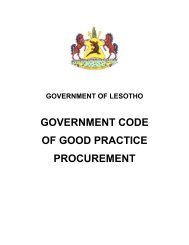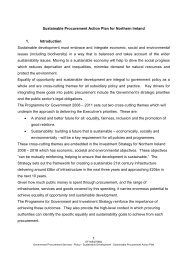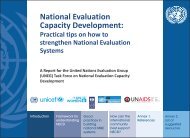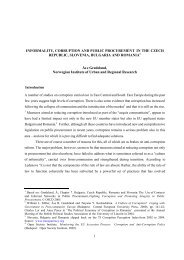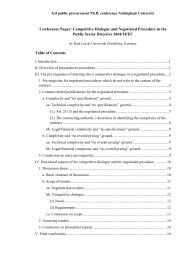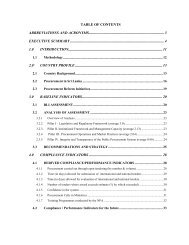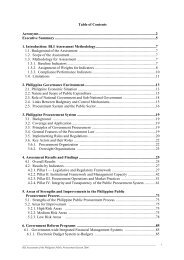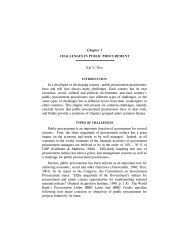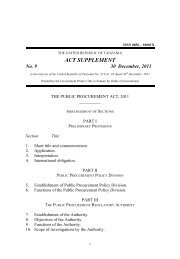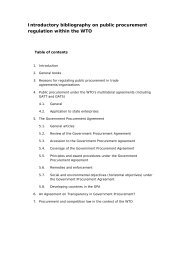The Public Procurement Rules 2008 - LGED
The Public Procurement Rules 2008 - LGED
The Public Procurement Rules 2008 - LGED
Create successful ePaper yourself
Turn your PDF publications into a flip-book with our unique Google optimized e-Paper software.
(h)<br />
Proposed Contract price.<br />
(4) A PEC shall neither seek nor permit changes in the rates quoted for staff<br />
remuneration proposed by an Applicant in selection methods where the Applicant’s price is used<br />
as a factor in the evaluation.<br />
(5) <strong>The</strong> PEC may require the consultant to substitute a key staff, if it was found during<br />
Evaluation that he is not fit enough for the proposed assignment.<br />
(6) If an extension of validity of proposals was the reason that key staff were not<br />
available for a Firm, a change of key staff with equivalent or better qualification may be permitted.<br />
(7) During negotiations special attention shall be paid to defining clearly the inputs and<br />
facilities offered by the Procuring Entity.<br />
(8) Negotiations shall include discussions about the TOR but shall not significantly alter<br />
the original TOR so that the integrity of the negotiations and the content and findings of the<br />
technical Evaluation Report cannot be called into question.<br />
(9) Major reductions in work inputs shall not be made solely to meet the budget.<br />
123. Failure of Negotiations and Rejection of All Proposals. |— (1) If negotiations fail<br />
and all Proposals are found to be non-responsive and unsuitable, the Procuring Entity may, with<br />
the approval of the Head of the Procuring Entity, reject them under the following grounds -<br />
(a) <strong>The</strong> Proposals present major deficiencies in responding to the RFP.<br />
(b) <strong>The</strong> Cost Proposals are substantially higher than the estimated budget and<br />
could not be bridged during negotiations.<br />
Example 1<br />
<strong>The</strong> Procuring Entity and Consultants disagree on which contractual party<br />
should be responsible for executing specific assignment activities, or on the<br />
exact content of the assignment or feasibility of specific deadlines affecting the<br />
implementation schedule of the project.<br />
Example 2<br />
Consultants may find the estimated man-months and the distribution of risks<br />
unacceptable. <strong>The</strong> Consultants may then present cost Proposals that are<br />
substantially higher than the available budget. <strong>The</strong> Procuring Entity may be<br />
unaware of the actual remuneration levels of the Consultants for the type of<br />
(2) Before rejecting all Proposals, the Head of the Procuring Entity should investigate the<br />
Services being considered, the Consultants may misinterpret the TOR, or the<br />
feasibility of increasing the budget or scaling down the scope of Services to meet the original<br />
Procuring Entity’s plans may be too ambitious for the available budget.<br />
budget.<br />
(3) If the Head of the Procuring Entity decides finally to reject all Proposals, the<br />
Procuring Entity shall reassess the proposed TOR and budget and undertake an accurate review<br />
of the RFP (including the short-list) to reduce the risks of non-responsive Proposals.<br />
124. Approval Process. |— (1) <strong>The</strong> Evaluation Report along with its recommendations<br />
and minutes of the completed negotiations shall be submitted to the Approving Authority in the<br />
manner as prescribed under Rule 36.<br />
(2) <strong>The</strong> Approving Authority, as described in the Delegation of Financial Powers issued<br />
by the Government from time to time, shall consider the Evaluation Report and the<br />
recommendations as submitted by the PEC and take a decision in accordance with Rule 11.<br />
105



